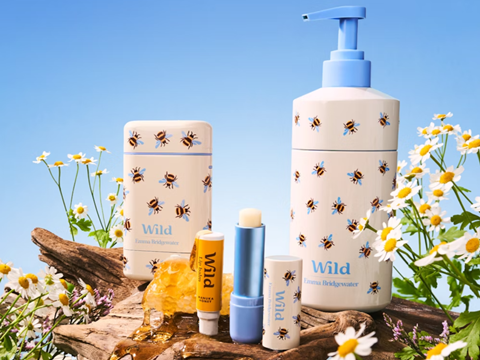
Now that Unilever has acquired personal care brand Wild, the companies are optimistic that refillable toiletries will become more accessible to consumers; yet questions have arisen whether the brand will lose sight of its sustainability focus under the pressure of financial targets.
Wild sells deodorant, body wash, hand wash, lip balm, and mini deos in reusable containers – all in hopes of eliminating single-use plastic packaging in consumers’ bathrooms without sacrificing effectiveness or convenience.
The original reusable case design features aluminium and plastic components that are difficult to recycle at home; this led the brand to partner with First Mile, which collects old cases to be broken down and recycled. Instead of coming at an extra cost to consumers, those who return their packaging for recycling receive £5 off their next order.
Now it has designed its deo cases to be dissembled by consumers, allowing the metal and plastic parts to be recycled separately.
Product refills are delivered directly to doorsteps in a direct-to-consumer retail model. They are provided in bamboo pulp packaging, which is believed to be recyclable or home-compostable at end-of-life; Wild asserts that each refill keeps 30 grams of plastic waste out of landfill.
Further efforts to eradicate plastic from its delivery packaging has included shredding old cardboard boxes to reuse as filler for large orders shipped from Wild’s 3PL distribution centre.
Founders Freddy Ward and Charlie Bowes-Lyon claim that Wild has diverted over 750,000 kg of single-use plastic since its inception, and 300 tonnes in 2024 alone. Now they hope to “leverag[e] Unilever’s global network and capabilities” to “reach more people than ever before, making sustainable personal care more accessible.”
“Our commitment to sustainability will only enhance as we’ll now be able to invest in cutting-edge technologies that will help reduce our environmental impact even further,” they continue. “We’re more excited than ever to continue pushing the boundaries of sustainability and make a real difference.”
Fabian Garcia, president of Unilever Personal Care, considers Wild “a perfect complement to our Personal Care portfolio” due to its “innovative approach to formulations and packaging, and social-first marketing” – noting that the company has “put consumers at the heart of the brand which is a testament to its success.”
Refillable packaging is one of Unilever’s long-term goals. Claiming to have run over 50 reuse and refill pilots worldwide, its work includes piloting refill solutions at supermarket chains and local markets across Sri Lanka, Bangladesh, and Indonesia; it has reportedly served 6,000 Indonesian consumers at 1,000 refill outlets and saved approximately 6 tons of plastics every year.
Such developments are hoped to correspond with Unilever’s targets of 100% reusable, recyclable, or compostable packaging, having set the deadline at 2030 for rigid plastics and 2035 for flexibles after (controversially) revising its targets for 2025 this time last year.
Indeed, Unilever CEO Fernando Fernandez describes the acquisition as “a very exciting addition to our portfolio as we look towards premium and high growth spaces as laid out in our Growth Action Plan 2030.”
Wild’s subscription model, direct-to-consumer delivery, and incentives for reuse and recycling are set to help Unilever expand into new packaging formats. Chief R&D officer Richard Slater previously commented on the need for “bold innovations that challenge existing designs, materials and business models” – emphasizing Unilever’s goal to “fundamentally rethink our approach and pave the way for new solutions such as reusable and refillable formats.”
Similarly, chief innovation officer Vas Taras told Packnode that “Wild’s refill-first model challenges the industry norm, and that’s exactly what we need to spark meaningful change. We’re excited to scale their packaging innovation across our global operations.”
Many have cited the acquisition as proof that eco-design sells, with Conjura considering it “a win for sustainable commerce. Proof that eco-led brands can scale profitably, attract loyal customers, and build businesses that make headlines.”
Bowes-Lyon specifies that “Unilever’s expertise, scale and reach” will help “further grow the brand and bring our vision to more consumers.”
He told ModernRetail that “our goal is to prove that Wild can be a mainstream brand, helping to drive sustainable packaging adoption across the industry.
“If we succeed, this type of packaging could roll out across more brands and become the norm.”
However, Blue Earth CCO and co-founder Guy Hayler asks: “Will Wild stay true to its impact values and continue as a positive disruptor? Or will profits and margins take priority, leaving purpose behind?”
He expresses his optimistic hope that “this signals a shift in the market. That a corporate giant like Unilever is reacting to the rise of purpose-driven brands forcing them to truly serve consumers who care about our planet. Because when big players change, the system changes.”
Yet he fears that purpose-led brands like Wild can lose control of their core mission if, once they have scaled up, their new owners don’t share the same ideologies.
Critics previously accused Unilever of favouring financial performance over sustainable conduct after it scaled back its sustainability targets for 2025. Conversely, Ken Pucker from Tufts University described the company as a “top quartile sustainability exemplar” and noted its involvement in negotiations for a Global Plastics Treaty – blaming its slow progress on reducing virgin plastics use on the price of its recycled alternative.
Regardless, Wild’s reuse and refill model is anticipated to take Unilever further in its ongoing work to introduce refillable packaging to new markets and advance a circular economy.
If you liked this story, you might also enjoy:
Reuse vs. single use – which is better for the environment?
Sustainable Innovation Report 2025: Current trends and future priorities
What can the world learn from South Korea’s world-leading performance in plastics circularity?














No comments yet